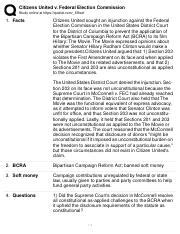Citizens United v. Federal Election Commission (FEC) was a landmark decision of the Supreme Court of the United States that was issued on January 21, 2010. The case concerned the constitutionality of restrictions on corporate and union spending in federal elections. The Court ruled that these restrictions violated the First Amendment’s freedom of speech and that corporations and unions have the same right to participate in political debate as individuals.

Key Points of the Decision
- Corporations and unions have the same First Amendment rights as individuals. This means that they can spend money to support or oppose political candidates and ballot measures.
- The government cannot restrict corporate and union spending in elections simply because it is done through a corporation or union. The Court held that this type of restriction is unconstitutional because it discriminates against corporations and unions based on their corporate or union status.
- The government can still regulate corporate and union spending in elections to prevent corruption or the appearance of corruption. However, any such regulations must be narrowly tailored to achieve these goals and must not discriminate against corporations or unions based on their corporate or union status.
Impact of the Decision
Citizens United has had a significant impact on campaign finance law in the United States. It has led to a sharp increase in corporate and union spending in elections. In the 2016 election cycle, for example, corporations and unions spent over $1 billion on political campaigns.
Citizens United has also been criticized for allowing corporations and unions to have undue influence over elections. Critics argue that the decision has led to a “corporatization” of politics and that it has made it more difficult for individual citizens to participate in the political process.
Arguments for and Against Citizens United
There are a number of arguments for and against Citizens United.
Arguments for Citizens United
- Corporations and unions are just as entitled to free speech rights as individuals. Restricting their spending in elections violates the First Amendment.
- Corporate and union spending in elections can help to inform voters about the issues. This can lead to a more informed electorate and better decision-making.
- Citizens United has not led to a significant increase in corruption or the appearance of corruption.
Arguments Against Citizens United
- Corporations and unions are not individuals and should not have the same free speech rights as individuals. They have a different role in society and can use their wealth to have an undue influence on elections.
- Corporate and union spending in elections can lead to corruption or the appearance of corruption. Corporations and unions may donate money to candidates in order to gain favorable treatment.
- Citizens United has made it more difficult for individual citizens to participate in the political process. The sharp increase in corporate and union spending has made it harder for individual candidates to compete.
Conclusion
Citizens United v. FEC was a landmark decision that has had a significant impact on campaign finance law in the United States. The decision has been praised by some for expanding free speech rights, while others have criticized it for leading to a “corporatization” of politics. The debate over Citizens United is likely to continue for many years to come.
| Argument | For | Against |
|---|---|---|
| Corporations and unions are entitled to free speech rights | Yes | No |
| Corporate and union spending can inform voters | Yes | No |
| Citizens United has not led to corruption | Yes | No |
| Citizens United has made it harder for individuals to participate in politics | No | Yes |
- Attend a campaign finance workshop. This can help you learn more about the legal requirements for campaign finance and how to avoid violations.
- Keep accurate records of all campaign contributions and expenditures. This will help you stay in compliance with the law and avoid any potential problems.
- Be transparent about your funding sources. This will help build trust with voters and reduce the risk of corruption or the appearance of corruption.
- Be mindful of the potential impact of your spending. Consider how your spending could be perceived by voters and whether it could lead to any unintended consequences.
Campaign finance law is a complex and ever-changing area of law. By understanding the basics of Citizens United v. FEC and by following these tips, you can help ensure that your campaign is compliant with the law and that you are doing your part to promote a fair and democratic electoral process.
